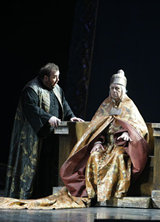| Opera Reviews | 17 May 2024 |
| Nucci
convincing in I due Foscari by Silvia Luraghi |
|
| Verdi: I due Foscari Teatro all Scala, Milan 2 April 2009 |
|
|
Besides knowing the role, Nucci also knew the production, having sung in it already six years ago, and he was able to work on his interpretation. His deep commitment to the role, accompanied as usual by an outstanding technique, allowed minor vocal flaws, such as some uncovered notes, to remain in the background, so that he was able to deliver the role in the most convincing manner. The same cannot be said of the other, much younger, singers in the cast. Tenor Fabio Sartori, as the Doge's son Jacopo Foscari, has a nicely colored voice and can sing in tune, although his breathing technique is not perfect; from an interpretative point of view, though, he remained rather on the generic side. Soprano Julianna Di Giacomo, as Jacopo's wife Lucrezia Contarini, was at odds with the tessitura, and her voice lost control when pushed into the demanding high register. Bass Marco Spotti, as member of the Council Jacopo Loredano, did not leave any memorable impression. In general, the acting was not especially revealing: it must be said, though, that one had the impression that stage directions were far from accurate and that the singers had been left to their own devices which, for most of them, were clearly not enough. The sets, designed by Maurizio BalÚ, who also took care of the costumes, had been planned for the wider space of the Teatro degli Arcimboldi, the company's temporary home at the time of the production premiere, but they also proved to provide a good setting on the stage of La Scala, even though this production will hardly be remembered in the production history of I due Foscari. The large sets featured different interiors in which the action takes place (the prison, Venice's senate, the Doge's palace), while the stage remained empty, except for the Doge's seat when needed, the costumes reproduced garments of the time, and the lights, by Luigi Saccomandi, contributed to create an unpleasant atmosphere. In the pit, conductor Stefano Ranzani did his best to facilitate the singers' task. The audience, eager for some Verdi, manifestly liked the production. |
|
| Text:
© Silvia Luraghi Photo: © Teatro alla Scala / Marco Brescia |

 In
a recent interview, baritone Leo Nucci, who will turn 68 this year,
said that at this point in his career, while he feels perfectly at ease
with his voice in a variety of roles currently in his repertoire, he
plans to increasingly limit his appearances to roles which he feels
are more fitting for his age from a theatrical point of view. In particular,
the baritone wishes to interpret operas in which he plays the role of
a father, and fortunately Verdi's scores still offer him plenty of opportunities,
as is the case with I due Foscari, currently playing at La Scala,
in which Nucci appeared as the Doge Francesco Foscari, in a revival
of the 2003 production directed by Cesare Lievi.
In
a recent interview, baritone Leo Nucci, who will turn 68 this year,
said that at this point in his career, while he feels perfectly at ease
with his voice in a variety of roles currently in his repertoire, he
plans to increasingly limit his appearances to roles which he feels
are more fitting for his age from a theatrical point of view. In particular,
the baritone wishes to interpret operas in which he plays the role of
a father, and fortunately Verdi's scores still offer him plenty of opportunities,
as is the case with I due Foscari, currently playing at La Scala,
in which Nucci appeared as the Doge Francesco Foscari, in a revival
of the 2003 production directed by Cesare Lievi. 





